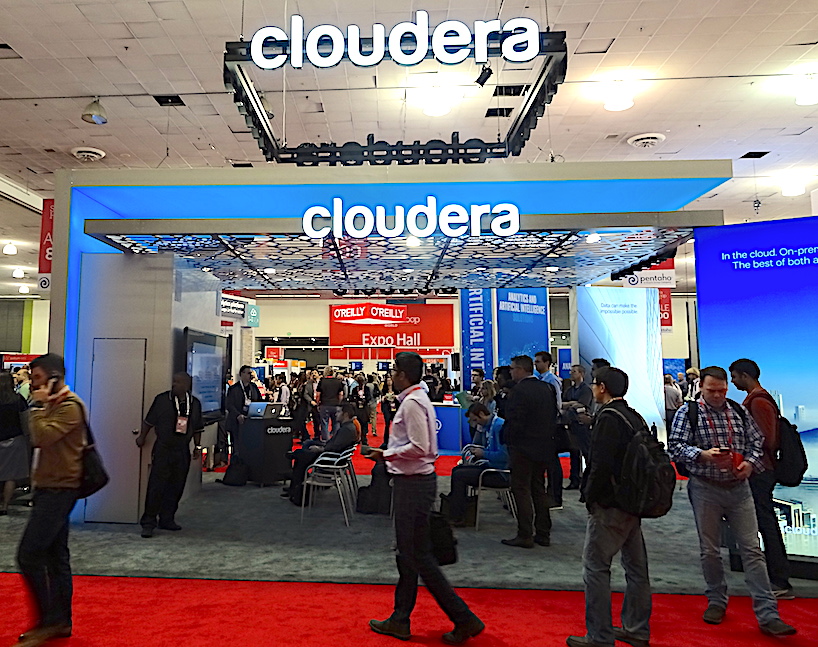 BIG DATA
BIG DATA
 BIG DATA
BIG DATA
 BIG DATA
BIG DATA
In its second quarter since going public in April, big-data firm Cloudera Inc. managed to beat expectations, reversing a first-quarter disappointment that saw its shares plunge 16 percent the next day.
The company, which sells machine learning and data analytics software and services to manage huge amounts of data across computer systems, also revealed that it has acquired Brooklyn-based machine learning research firm Fast Forward Labs. Cloudera co-founder, Chairman and Chief Strategy Officer Mike Olson said Hilary Mason, FFL’s co-founder and chief executive officer, will become the larger company’s vice president of research, with an aim to supplement the company’s application of machine learning and deep learning neural networks to “practical business problems.”
Olson emphasized the extent to which machine learning is driving growth at Cloudera. “Fast Forward Labs is a significant strategic bet for us on machine learning and artificial intelligence,” Olson said on the earnings call.
“Big-data repositories have become the foundation of deep learning networks, so it is important that Cloudera plays in this relatively new use case for big data,” said Holger Mueller, vice president and principal analyst at Constellation Research. “The power of the AI/ML use case makes us predict a second spring for big data, as it is the only place where enterprises can store all their electronic knowledge in a cost-efficient way.”
As for the results, Cloudera said it lost 17 cents a share before certain costs such as stock compensation in the second quarter. Net loss, which included a much larger $39.5 million in stock compensation this quarter following the IPO compared with just $5.6 million a year ago, was $64.2 million, up from $38.2 million a year ago. Revenue rose 39 percent, to $89.8 million.
Both profit and revenue results beat analysts’ forecast of a 25-cent adjusted loss on revenue of $85.5 million. Investors, who slammed the shares after the first-quarter report on signs that future growth might ease, bid the shares up as much as 6 percent in immediate after-hours trading, though by the close the next day, they had fallen nearly 2 percent, to $20.99 a share.
Subscription revenue, seen as a key metric because subscriptions are steadier than software licenses, jumped 46 percent from a year ago, to $74 million. It’s now 82 percent of total revenue, up three points from last year.
The initial positive reaction, muted as it became by Friday, likely had less to do with second-quarter results than with Cloudera upping its outlook for the third quarter and full fiscal 2018. The Palo Alto, California-based company forecast a third-quarter loss of 23 to 25 cents a share, lower than the consensus 27 cents, on revenue between $90 million and $92 million — higher than the consensus of $88.3 million. Likewise, for the year, Cloudera’s 93- to 95-cent loss and revenue range of $355 million to $360 million beat Wall Street numbers.
CEO Tom Reilly said the company “outperformed on sales, customer acquisition, customer expansion and cash flow objectives.” It netted 45 new customers in what it calls the Global 8000, and saw a net expansion rate for existing customers of 140 percent.
Still, perhaps weighing on investors overnight, the continuing losses remain a big uncertainty. “At the moment, it is not clear how Cloudera will turn to profitability, and when, which it ultimately has to do,” said Mueller.
Cloudera was the second of the three main big-data firms to go public, following Hortonworks Inc. back in December 2014. Although MapR Technologies Inc. Chief Executive Matt Mills said in June that an IPO was in the cards at some point, it looks like it isn’t imminent. This week, MapR raised a new $56 million round that gives it some breathing room.
But all of them face increasing competition from the big cloud providers such as Amazon Web Services Inc., Microsoft Corp.’s Azure and Google Cloud Platform, which keep offering more features that often have the advantage of being simpler and more integrated with each other. Enterprises view that as appealing, especially at a time when open-source and commercial big-data analysis projects keep proliferating.
“At some point, enterprises want to start standardizing,” said George Gilbert, an analyst with Wikibon, owned by the same company as SiliconANGLE. He said it will be difficult for individual companies to consolidate not only the features but sales strategies for all the new technologies as well as the big cloud providers can.
THANK YOU